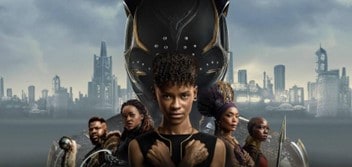
By Andrew Jenck
No matter the insight, reviews are essentially opinions of the author, ones that can change over time. As such, I find my initial thoughts of the original Black Panther, although positive, a bit too dismissive of the themes it presented and lacked awareness of the cultural significance. Not just for having a majority African-decent cast. but one fully immersed in it. Despite some pacing issues and an over-bloated climax, Black Panther had a hero and villain with the same ambitions but differing philosophies, telling a more complete narrative than other superheroes that only touch upon real world commentary while director Ryan Coogler embraced such. Wakanda Forever continues this trend, serving as a tribute to Chadwick Boseman and genuine continuation of his solo film. The result is another ambitious entry into the MCU that has a solid core making up for other layers not quite as well developed.
The void left by Boseman’s passing is impossible to fill, so the film acknowledges this by making its central theme grief and how it affects the characters. Despite the change in focus, this is a genuine continuation of the original: T’Challa globalizing Wakanda places the country at the center of global discussion, sparks exploitation of the rare Vibranium by outside forces, and brings conflict with a nation below the depths, ruled by King Namor. Wakanda’s royal family must now deal with this fall out while processing their emotional state.
Casting is stellar across the board. Angela Basset and Danai Guriria give such power and gravitas to their characters. Lupita Nyong’o is a natural, as always. Namor is a solid antagonist, played with conviction by Tenoch Huerta. Ludwig Göransson graces the scenes with a score that compliments these performances, continuing his hot streak as a composer. However, Letita Wright, while fine, doesn’t have the same presence, even ignoring her controversial stance on vaccines. Although given a good arc, she seems out of her depths, feeling rushed into this new role as the script was reworked constantly.
Themes are touched upon, such as American imperialism, border conflicts, distribution of resource, and faith vs. science; all of which feel undercooked. Nyong’o’s Nakia encompasses most of these themes yet isn’t given as much focus as she should in this series. Iron Heart and Agent Ross have their place in this story, but they can get sidelined and could’ve been integrated better. The emotions are genuine, but these script problems can pull me out it sometimes. It’s understandable, but I wish the filmmakers could’ve been given more time to fully develop these ideas.
Coogler continues to craft intimate scenes and continues great world building in this section of the MCU. Simultaneously, it does feel like his vision comes at odds with obligations from Marvel. There are a few forced comedy bits here, though lesser than its contemporaries. Set pieces continue to be the weaker point of Black Panther, having another generic chase sequence and set pieces that feel like a discounted version of Avatar 2. Some action works well, when Coogler gives it more grounded weight, but it feels like a second unit took over whenever there is CGI. Marvel has come under scrutiny for rushing effects artist, as the quality of the CGI has decreased, given the abundance of projects. It’s still Coogler’s vision, albeit a compromised one.
The central theme and conflict keep this film afloat, even when mushing through the shortcomings of modern superhero movies I can’t see myself revisiting this picture that often, but it proves to be an engaging romp at the cinemas. Given the production issues, Coogler and his team warrant admiration, though his vision may have been fully realized if Marvel wasn’t insistent on the target release date. Nevertheless, this is still an engaging film with relevance and an impressive cast of people who don’t get these opportunities that often. It’s a good film, just doesn’t quite reach its full potential.


